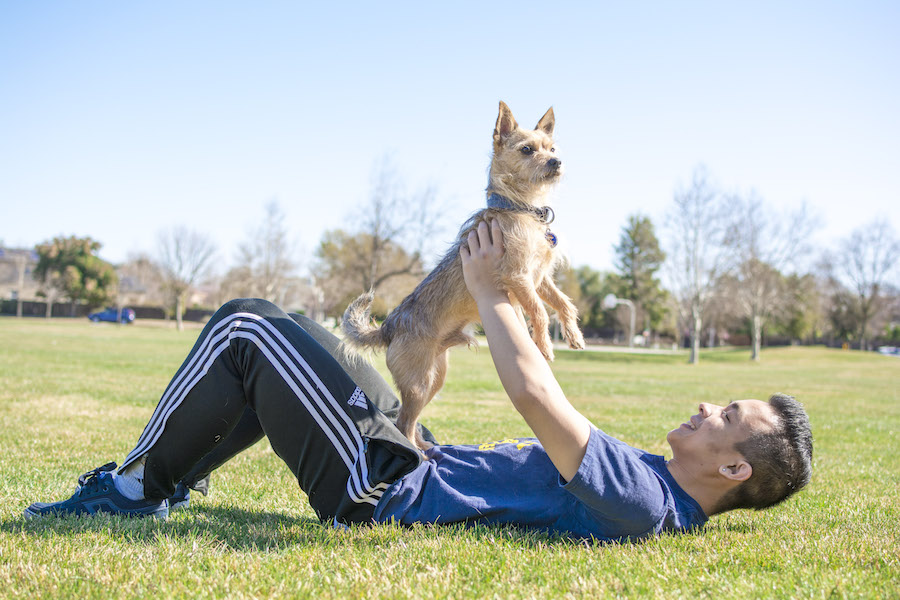 The bachelorette for dogs
The bachelorette for dogs
Taking care of a dog can be a lot of work — walking it, feeding it, giving it all the love and attention it deserves. Within UC Davis’s renowned veterinary school, this dream job exists. Known as the Canine Enhancement Program, the program gives vet students the opportunity to care for dogs and get paid for it.
So how does it work? The purpose of the program is to serve both the dogs, who are referred to as “colony dogs,” and the students in the vet school. Every year, 15 dogs are chosen to be part of the program for the duration of the school year.
“We hand pick [the dogs] from local shelters and select them based on their temperament,” said Tatiana Taylor, the senior animal technician supervisor for the Gourley Center and a kennel supervisor and adoption coordinator for the Canine Enhancement Program. “We want dogs who will be happy in this program and want to be loved and enjoy participating in student teaching.”
An extensive selection stage is necessary to ensure the colony dogs can fulfill the role of a teaching dog. Likewise, the students enrolled in the program, or “enrichment walkers,” are carefully selected and trained to ensure a good match and that the dogs are properly socialized. There is a six-week trial period where the enrichment students rotate walking all the colony dogs to get to know each other. The walkers then send in their top choices of which dog they would like to be matched with and are matched accordingly.
“We match [dog and walker] to maximize the enrichment, to ensure a positive experience for the dog and the student,” Taylor said. “So if the student is a runner, I’m going to give them a lab versus a couch potato [dog]. We pick walkers who want to do activities with the dogs, are willing to potty-train them and properly socialize them, so that they are prepared for adoption at the end of the year.”
Though the dogs do have designated living spots on campus where they are cared for by a team of Gourley animal health technicians, enrichment walkers are encouraged to take the dogs home and spend as much time with their colony dogs as possible. Students are allowed to house them, take them hiking and on vacations, bring them home for the holidays and introduce them to friends and family.
“We have the freedom to treat the dog as if they were our own,” said Naomi Barney, a third-year veterinary student who has fostered three dogs through the program. “I take them out hiking and I get to do all the fun things you would do with your own dog.”
Barney currently cares for two dogs: Bia, a gray terrier mix who was her colony dog from last year whom she adopted, and Chevy, a lab/hound mix who is her colony dog for this year.
“My favorite part [of the program], wow, that’s hard to choose,” Barney said. “I really like being able to take care of these dogs, a lot of them come from shelter backgrounds, so being able to give them a home for a year and love them.”
At the end of the year, the dogs graduate from the program and are released to be adopted.
“Students get priority adoption,” Taylor said. “If the students aren’t interested we will open up applications to the public, if no other students or faculty line up applications to adopt.”
However, due to the extensive and personalized pairing process, most enrichment walkers end up adopting their colony dogs.
“It’s like ‘The Bachelorette,’ but for dogs,” said Kelly Morello, a third-year veterinary student. “We have a say in it, but Tatiana picks what is best for the dogs, and a lot of the time that means a forever home.”
Morello’s colony dog is a half German Shepherd, half Staffordshire Terrier named Tacoma.
“Tacoma is my best friend, she has gotten me through this tough third year as a vet student,” Morello said. “She is such an incredible dog, she is my doggie soulmate, the perfect fit for me. I cannot wait to officially adopt her.”
In addition to the colony dogs being an educational tool for their enrichment walkers, they also serve the larger student body. The colony dogs’ main duty is to attend lab classes several times a month.
“Although we treat them like they are our own dogs, we do not own them,” Morello said. “The biggest difference is that they have class, they are working animals.”
The dogs attend classroom labs and provide educational experiences for students. These noninvasive instructional programs teach vet students about animal handling, PE, radiology, ultrasound, orthopedic examinations and behavior temperament examinations.
“They have to spend time away from us at school, so naturally they have higher stress levels,” Morello said. “So we are their guardian angels, we get to care for them and look for signs of stress. Our number one priority is their happiness.”
Every year, vet school students are given the opportunity to send in their applications and be added to a waitlist. Morello was on the waitlist for a year before she was selected.
“Being a colony walker is a sought-after position, everyone wants to be a part of the program.” Morello said. “We get paid, but we do it for the dogs. We love the dogs so much.”
Written by: Grace Simmons — features@theaggie.org



